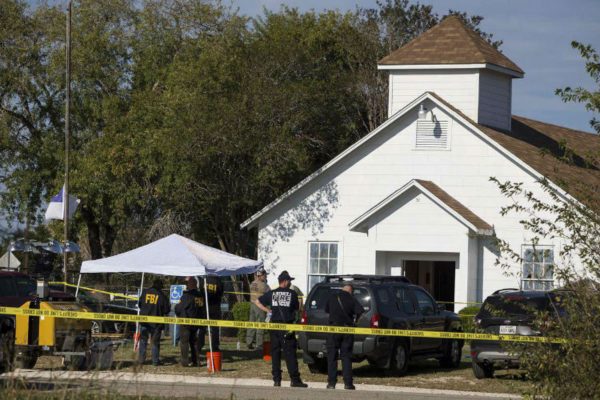The fact that a bystander armed with his own rifle chased and shot the perpetrator in Sutherland Springs crucially transforms the terrain of the political interpretation of the shootings.
The presence of an armed citizen “shooting in the opposite direction,” as President Donald Trump put it in the hours after the killings, activates partisan attitudes about guns in Texas that advocates and political leaders can use to stifle discussion of adding even the mildest restrictions to guns. That’s because the thought that the best antidote to gun violence is good people with guns resonates sufficiently with the right audience of Republicans.
Broadly speaking, this “good guy with a gun” approach to prevent mass shootings comes from hybrid roots that include diffuse but questionable readings of history projected onto the present by political leaders, decisively debunked social science research, and, of course, a non-trivial but also non-representative set of anecdotes. The essence of the proposition is simple: The best thing for stopping a bad guy with a gun is a good guy with a gun.
More specifically, faith in the efficacy of packing self-protection is evident in the attitudes of Texas Republicans. In the October 2017 University of Texas/Texas Tribune Poll, we asked Texas voters, “If more people carried guns, do you think the United States would be safer, less safe, or would it have no impact on safety?”
Overall, 38 percent of Texas voters polled said the U.S. would be safer; 41 percent said it would be less safe. Beneath this close division in attitudes, there are sharp partisan differences: 66 percent of Republicans said it would make us safer, and 75 percent of Democrats said it would make us less safe.
Among tea party identifiers, who have helped drive the loosening of gun restrictions, including the push in the Texas Legislature in 2015 to allow open carry, 85 percent said it would make the U.S. safer.
The fact that an armed bystander engaged the Sutherland Springs perpetrator leads one to expect this line of response to supplement, if not entirely supplant, the habitual recourse to mental health in long-term responses to the latest episode.
In strictly pragmatic terms, the frequent emphasis on mental health has obvious political benefits for opponents of any legislation on gun access or ownership: It fits into people’s, and especially Republicans’, preconceptions about the causes of mass shootings. At the same time, it remains faithful to the fact that GOP voters are generally opposed to stricter gun control laws — especially when mobilized.
Ironically, this incident highlights the potential limits of Republican elected officials’ usual reliance on invoking mental health policy as an alternative to modifying gun laws to deflect action until public interest and attention drifts to another subject. It doesn’t take long at all.
In our October 2017 poll, conducted less than a week after the concert shooting in Las Vegas, only 6 percent of Texans thought gun violence was the most important problem facing the country. Nonetheless, the frequency and visibility of mass shootings could eventually contribute to calls for solutions that might involve more thorough screening of gun purchases — something anathema to Second Amendment proponents.
Herein lies the political value in the current moment of the good guy with a gun narrative: It transforms the problem into its solution, even as it reduces the chances of backsliding into politically distasteful discussion of regulating gun ownership.
Any discussion of curtailing gun rights can be swiftly, and easily, met with a simple retort: How much worse would this have been if there hadn’t been a good guy with a gun? So while this tragedy may lead some Texas Democrats and liberals to think that the mass murder in Sutherland Springs might tilt the state’s conversation on gun control and gun ownership, the opposite is more likely.
Moving forward, we should expect the presence of an armed civilian returning fire and its narrative of a good guy with a gun to drown out discussion of even relatively minor adjustments to gun ownership practices — even those that might fit within the usually reliable mental health narrative.
Jim Henson is the director of the Texas Politics Project at The University of Texas at Austin.
Joshua Blank is manager of polling and research of the Texas Politics Project at The University of Texas at Austin.
A version of this op-ed appeared in the Dallas Morning News, Fort Worth Star Telegram, Austin American Statesman, Corpus Christi Caller Times, and the Abilene Reporter News.
To view more op-eds from Texas Perspectives, click here.
Like us on Facebook.




